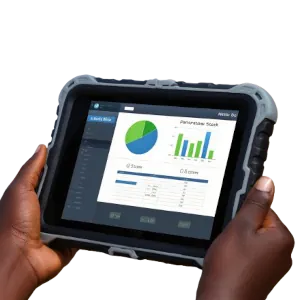Beyond fragile donor pilots and patchy data apps — we design and deliver Facility Management Information Systems (FMIS) that keep clinics, hospitals, schools, and vital local services running, even when the grid or internet goes down.
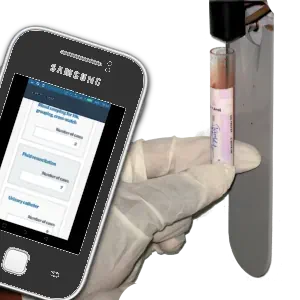
Where We Come From. And Why It Matters.
Before our FMIS was any FMIS, we were building the blocks piece by piece:
- 2000s: Open-source lab systems for reference labs and digital surveillance, when fragile paper trails failed.
- 2010s: Offline-first hospital medical record systems and outbreak tools that stayed live through power cuts and zero signal.
- 2020s: Smart solar, full facility management scope, local training labs — the complete last-mile backbone.
We have spent decades building what others promise on paper — side by side with real frontline staff, for real local control.
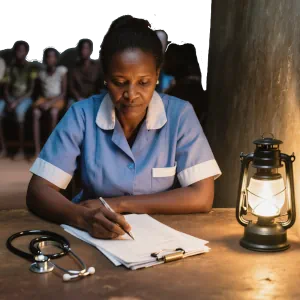
Sia's Story
Sia is a nurse at a busy community health centre in the East of Sierra Leone. One morning, Hawa brings her baby boy, Musa, burning with fever and coughing badly. Sia checks Musa’s weight and temperature, writes them in the daily register, fills in a treatment form, notes his medicines in the drug register, and completes a vaccination and nutrition chart — before updating Hawa’s own record book, the only piece with a history of all Musa’s visits, which will follow him home. It soon turns out that Musa needs more care than the health centre can provide. With no referral slips left, Sia writes a quick note on a scrap of paper and sends Hawa and Musa to the district hospital in Kailahun town — a long, bumpy motorbike ride away. There, the staff start afresh: there is no way to send a copy of Musa’s record with him. Test results done at the hospital stay in the hospital file. Luckily, Musa recovers well and comes home for follow-up at Sia’s health centre — but when he returns, there is no test result, no updated treatment plan, and Sia starts all over again with another round of paper forms. At the end of every month, torn between patient needs and reporting deadlines, Sia sits by lantern light, adding up every visit, every treatment, every stock entry by hand, so the district health team can spend weeks checking and re-entering the same numbers in the national system. The same data passes from clinic to district office to national forms, copied and boxed away — with mistakes creeping in at every step.

Why Conventional Solutions Fail
Donor-funded interventions may help digitise specific programme areas, as long as power and internet hold. But they rarely take a holistic, systemic view — and when the grid or signal fails, they stall altogether. That is why our approach is practical: Our FMIS works offline, stays powered by local solar, and runs on local skills. We transfer technology and train local people to build and manage it themselves — no waiting for another donor cheque, just local trade and lasting local value.
“Never enter the same data twice.”
— The rule every frontline worker knows
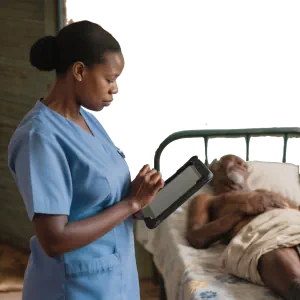
Our Solution. An FMIS That Blends In.
Our Facility Management Information System (FMIS) adapts to your needs — not the other way around — and optimises your workflow. It is fully offline-first; no more waiting for a signal. It stays running on local solar power, maintained by trained neighbourhood technicians, so the grid does not dictate who gets data. It links patient care, supply chain, accounting, HR, and infrastructure management in one simple platform — not donor silos that themselves create duplication. Rugged low-spec tablets, not fragile laptops, put data in the hands of every nurse, right at the bedside. And it is owned and run by local teams, so the know-how stays where it belongs — in-country, for good.
Under the hood, our FMIS is fully free/libre and open-source software — no hidden licenses, no locked-in code. We build on proven open-source ERP, dashboards, data sync, and secure backups. Everything stays ISO-ready, standards-based, and easy to integrate — no bespoke black boxes. Upgrades happen remotely whenever possible: with directional Yagi antennas for over-the-air sync, or by simply carrying the tiny SoC FMIS server to the next district meeting, where it updates automatically.
- Local servers: Low-power hardware, solar-ready, resilient in harsh conditions.
- Local language: Easy customisation means no programmers needed, and swift integration in local languages.
- Offline & integrated: Runs fully offline-first, auto-syncs when a signal is up — no data loss.
- Proven modules: Covers patient care, supply chain, accounting, HR, quality — all in one standardised system.
- Beyond health: Works for schools, councils, utilities, local services too.
“Empowerment of individuals is a key part of what makes open source work, since in the end, innovations tend to come from small groups, not from large, structured efforts.”
— Tim O'Reilly
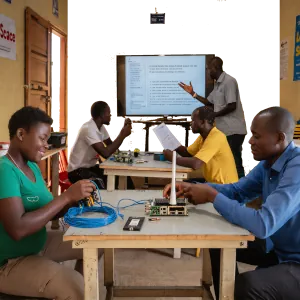
How It Works. Tech + Local Know-How.
FMIS is built for the last mile — but more importantly, it is built to stay there. And we do not just drop the system — we train real master trainers to build and run it from scratch: hardware, LAN cables, system installation, the full works. Carefully maintained SOPs cover every step, from software install to daily maintenance, backed by blended learning — from multilingual e-learning with with complete offline access, to hands-on labs for the skills you cannot learn on a screen.
And when there is no signal? FMIS keeps working anyway. Local servers sync to encrypted mobile devices that travel with staff to the district capital — bridging the last mile by hand if needed. Once connected, dashboards update automatically — no manual data entry, no hidden tweaks, just smart searches and real-time mining when you need it.
- Local sysadmins and application specialists: Tinkering labs train real problem-solvers — not just data entry clerks.
- Smart procurement: Direct hardware sourcing — replacing costly middlemen with affordable transparency.
- Flexible scale and scope: Expand beyond health — into logistics, education, hospitality — with modules that readily adapt as needs change.
Integrated: Local servers sync securely to national dashboards — over the air or via encrypted device transfer when there is no signal.
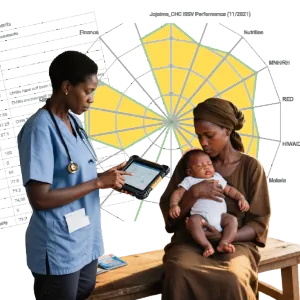
Impact So Far. Less Forms. More Care.
Wherever we have piloted the FMIS, health workers spend less time on bureaucracy and more time with patients. Stockrooms run smoother, vaccines stay potent, referrals do not get lost. Local data stays local — but summaries sync automatically with national systems, so staff at all levels can use data for what it was meant for: real-time, everyday decision-making. It is the payoff from years of building together — with real local teams in charge.
- Time freed up: No duplicate data entry, more care at the bedside.
- Better continuity: Patients and records stay connected and aggregated across clinics, labs, and hospitals.
- Resources protected: Cold chains, stocks, and equipment run smarter.
- Informed decisions: Reliable, timely data supports evidence-based planning at all levels.
- Local control: Facilities own their data — no wasted effort.
- Skills transferred: Every rollout creates local expertise — a growing body of knowledge that stays in-country.
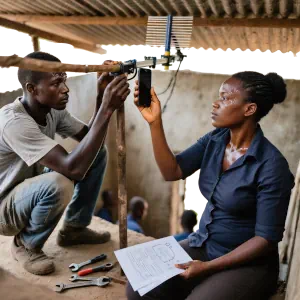
What's Next. Scaling Local Ownership.
We are scaling the FMIS from clinics to hospitals, schools, and local councils — tying it all together with smart solar, local comms, and real-time monitoring, so short-term pilots become permanent digital backbones. At the same time, we are growing our tinkering labs and teaming up with local academia — so research, skills, and practice feed each other where they are needed most.
- Scope & scale: Full districts, multi-sector — from rural clinics and hospitals to local councils and schools.
- Resilience: Solar-powered, hybrid comms — data flows off-grid, no signal needed.
- Local talent: Tinkering labs turn out real problem-solvers — sysadmins, hardware techs, SME founders.
- Academia: Students and researchers create real products — turning research into practical, local solutions.
Let's Forge Smarter Systems. Together.
Your data. Your people. Your power.
Solar-backed, offline-first, open-source — built to work when the grid fails, run by local teams for good.

